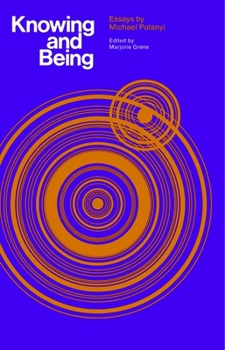Knowing and Being: Essays by Michael Polanyi
Select Format
Select Condition 
Book Overview
Because of the difficulty posed by the contrast between the search for truth and truth itself, Michael Polanyi believes that we must alter the foundation of epistemology to include as essential to the... This description may be from another edition of this product.
Format:Paperback
Language:English
ISBN:0226672859
ISBN13:9780226672854
Release Date:January 1969
Publisher:University of Chicago Press
Length:264 Pages
Weight:0.70 lbs.
Dimensions:0.6" x 5.4" x 8.4"
Customer Reviews
1 rating
Epistemic Rights and Ontic Necessities: Polanyi
Published by Thriftbooks.com User , 15 years ago
That lady in the white lab coat is exceptionally astute and she's a major player within the global scientific community, but she is so befogged about the source and the proper criterion for justified knowledge that she subjects herself to self-stultification forasmuch as she relies on brute empiricism as her epistemic ground. Herein Michael Polanyi deploys powerful and commanding epistemic fog lights to shine the blazing light of truth on epistemology in relation to science and the pursuit truth (Polanyi, 1891-1976, was a European chemist who became a groundbreaking philosopher and epistemologist). In the last third of his academic life the author searched for truth and a definitive criterion for knowledge itself. Dr. Polanyi proposed that one must rework the ground and fount for epistemic virtues and privileges as he attempted to partially comprise an accurate theory of knowledge enjoined to the nature of man's cognitive apparatus and the comprehension of epistemic intricacy/complexity. Polanyi: "I hold that the propositions embodied in natural science are not derived by any definite rule from the data of experience, and that they can neither be verified nor falsified by experience according to any definite rule." This volume consist of 14 interrelated essays (accumulated by Marjorie Grene) that convey the progress of Polanyi's epistemology first offered in "Science, Faith, and Society." Polanyi offers unique epistemic insights as he asserts that epistemic rights are obtained by central and subsidiary aspects of awareness while fixing on the article at hand while focusing on less important derivative things as epistemic backdrops. For Polanyi "normative structures such as interpretive frameworks, or even languages, work like hammers... I indwell them, I pour myself into them, to attend beyond me a further focus or project. All knowing involves integrative orientation from subsidiary to focal, from `from' to `to' and beyond" He asserts: "So long as we use a certain language, all questions that we can ask will have to be formulated in it and will thereby confirm the theory of the universe which is implied in the vocabulary and structure of the language." Polanyi emphasizes that the predicament of contemporary epistemic questions are usually left unasked as modernity focuses on alleged detachment and objectivity of scientific knowledge as it too often ignores the necessary ethical structures. Polanyi deems that epistemic rights and true truth arise from internal indications to external facts and concrete evidence. Consequently, to ascertain proper epistemic rights, one is required to build a theory from the web of the ontic reality of biological things and this incorporates the mind as well. He opines: "Of course language manifests a belief only if we use its words with the implied acceptance of their appositeness." One is not required to limit oneself to Polanyi's epistemic presentation to admire his genius and gain exceptional insight into t





